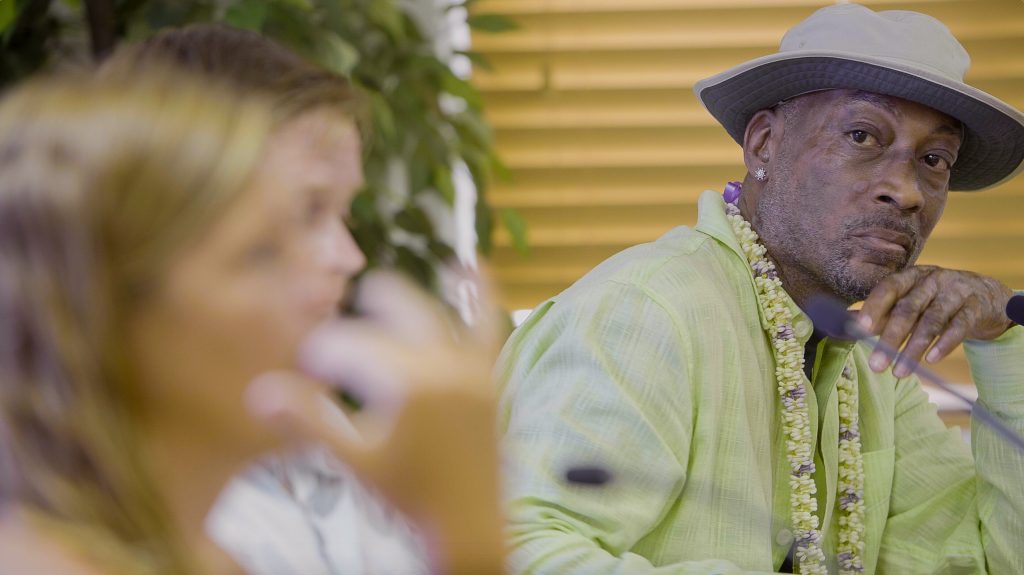Historic Plaintiff Discusses Pesticide Impacts With Maui Policy Makers
A man noted as being the first plaintiff to win a lawsuit brought against Monsanto/Bayer, met with government land management agencies and policy-makers on Maui.
DeWayne “Lee” Johnson was a groundskeeper in a school district in the California Bay Area where he regularly used the Roundup product. He developed non-Hodgkin’s lymphoma and sued the company for allegedly failing to warn the public of its products’ “carcinogenic dangers.”
The company has since appealed the multi-million dollar award it was ordered to pay, claiming the scientific evidence presented at trial did not prove Johnson’s condition was caused by their product. Johnson, has since filed his response and cross appeal in his lawsuit.
In April, the EPA issued a statement that it “continues to find that there are no risks to public health when glyphosate is used in accordance with its current label and that glyphosate is not a carcinogen.”

Photo: (left) Autumn Ness, Beyond Pesticides’ (middle) Duane Sparkman, Organic Landscaper; (right) DeWayne Lee Johnson. Photo credit: Chelsie Machado
Hawaiʻi ’s Protect Our Keiki coalition hosted a small, intimate talk story session with Johnson on Monday, as part of a continuing effort to reduce the amount of pesticides used in the islands. Organizers say “there are growing concerns about the risks those chemicals pose to public health and our fragile island environment.”
“It’s important for people to know this stuff, to know about what they’re being exposed to. If people have the information they can make choices, they can be informed and protect themselves,” said Johnson. “I’m just a regular guy from a small town called Vallejo, who happened to seek the truth about my failing health and found answers.”
“I think people are starting to see that there is something going on with this product. I’m living proof of that,” said Johnson. “I’m the weed that didn’t die. You know what I mean?”
In 2016, in response to local concerns about pesticide safety, the Maui County Parks Department, with the assistance of Beyond Pesticides, implemented a five-site Pesticide Free Parks Pilot program, and are currently seeking to expand the program, with support and training from local organic landscapers.
The event also featured Duane Sparkman, a local organic landscaper from the Westin Kāʻanapali. “If we have a chance to make a positive change for the health and well being of our people and environment, why not push for that change? There are alternatives to pesticides. Reach out to us and ask questions,” said Sparkman. Be part of the change and share the knowledge. Your friends, family and garden will appreciate it.”
According to information compiled by the Protect Our Keiki coalition, there are more than 40 counties, cities and school districts, including Miami, Irvine and Los Angeles that have already implemented bans on Roundup and/or all synthetic pesticides. Members of the coalition are working to persuade counties across Hawaiʻi, and the state Department of Education to join them.
Maui County Council Member Shane Sinenci said that he plans to introduce a bill doing just that.
“We now know the human and environmental dangers of using toxic pesticides and herbicides. We have the ability to use sustainable practices and environmentally friendly pest and weed control. This approach can be very effective and cost efficient,” said Sinenci. “This summer I will be working with the Department of Public Works and the Department of Parks and Recreation to finalize the bill. I feel encouraged that we are able to work together to do what is responsible for the environment, county workers, and residents.”
Autumn Ness, the Hawaiʻi Organic Land Management Program Director for Beyond Pesticides, which supported the Maui County Pesticide Free Parks program said, “there is no better time than now to make the transition from cancer-causing pesticides to an organic approach using alternative methods and resources.”
“Hawaiʻi has the opportunity at this moment to change direction and adopt a totally new mindset with regard to how we tend our green spaces. We have experts and resources available to us through the Maui pilot project with Beyond Pesticides,” she said.
“Based on the experience of cities like Irvine in Southern California, we know there is essentially no cost difference to making the transition to safe organic land management practices. It’s simply a matter of changing your approach,” said Ness.
The Protect Our Keiki coalition includes the Hawaiʻi Alliance for Progressive Action, Beyond Pesticides, the Hawaiʻi Center for Food Safety, Hawaiʻi SEED, Pesticide Action Network and the Frost Family Foundation.
Johnson will also be speaking at a few other intimate gatherings around Hawaiʻi, and at a Board of Education hearing on the use of pesticides in schools. The Board of Education hearing will take place on June 24 at 5 p.m. at Leilehua High School on Oʻahu, and is open to the public.




_1768613517521.webp)



